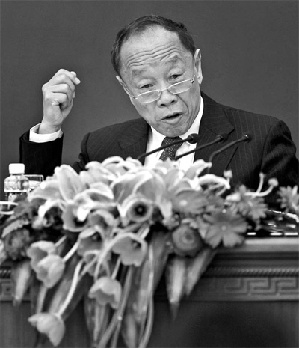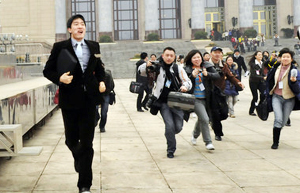Electoral Law revision key to equal rights
By Zhu Zhe (China Daily)
Updated: 2010-03-05 07:43
Beijing: Amending China's Electoral Law, a key issue for this year's session of the National People's Congress (NPC) that opens on Friday, is expected to give rural residents as much say in national decision-making as their urban counterparts.
|
|
|
National People’s Congress session spokesman Li Zhaoxing speaks to the media during a news conference in the Great Hall of the People in Beijing on Thursday. NIR ELIAS / REUTERS |
The draft amendment to the Electoral Law has proposed equal electoral rights for urban and rural citizens, which, if passed, will "expand people's democracy and safeguard their rights to be the masters of their own destiny", Li Zhaoxing, spokesman for the third session of the 11th NPC, the country's top legislature, told reporters at a press conference on Thursday.
The draft amendment, for the first time in China's history, requires both rural and urban areas to adopt the same ratio of deputies to the represented population in the election of people's congress deputies.
The change sets out to correct an imbalance in lawmaker elections, said Han Dayuan, a Constitution law professor with the Beijing-based Renmin University of China.
Under the existing law, each rural deputy represents four times as many people as an urban deputy. According to official calculations, it means some 960,000 rural people are represented by one NPC deputy, while 240,000 urban residents are represented by one deputy.
Currently, the NPC has about 3,000 deputies. Critics fear the current system helps a bias toward urban issues.
Li said the existing imbalance in representation among lawmakers started in 1953, when the first version of the Electoral Law was adopted. At that time, the law stipulated that one NPC deputy is elected for 800,000 people, but in municipalities and cities with a population of more than 500,000, every 100,000 people could have a NPC deputy.
"At that time, the number of people represented by each rural NPC deputy was eight times the number represented by each urban deputy, but it was in line with the reality in China back then," Li said.
In the early 1950s, there were about eight times more Chinese living in the countryside than in cities.



